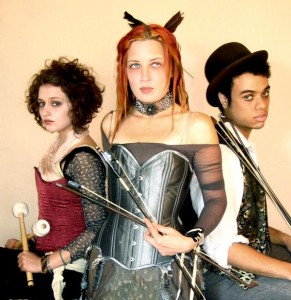Melora Creager’s inspiration for Sister Kinderhook’s “Snow-Hen of Austerlitz”?
Feral children.
 “I was obsessed with this feral children Web site, and the song just came out really easily,” Creager, the charming founder of Rasputina, says. “The banjo and the lyrics came out naturally.” Rasputina plays One Eyed Jacks Wednesday.
“I was obsessed with this feral children Web site, and the song just came out really easily,” Creager, the charming founder of Rasputina, says. “The banjo and the lyrics came out naturally.” Rasputina plays One Eyed Jacks Wednesday.
Songs come to Creager through weird facts or ideas that she stumbles across when reading on the Internet or in books. She keeps notes on what excites her, and some of those notes evolve into the next Rasputina song through a collage-process. “Holocaust of Giants”, another song on the recently released Sister Kinderhook, began with a conspiracy theory that giants were real but wiped out themselves during a giant genocide. Creager matches the lyrics with a jaunty rhythm that evokes wonder and adventure, and her voice trills with excitement about incredible giant fossils found in Ohio.
Sister Kinderhook creates a fantastic version of Colonial Federalism. Creager originally planned a lighter, “colonial-Vaudeville”-esque theme but her new digs in Columbia County, New York inspired her to compose beautiful folk tales that draw on historical events and nature. Her cello lends itself to the poetic tales, evoking a wide range of emotions throughout the album. It is joined by a banjo on the woeful “Snow-Hen of Austerlitz”—the “snow-hen” of the song, by the way, is not a hen but a feral child whose locked in a birdcage.
“You can express a lot through the sound- all different kinds of emotion,” Creager says of the cello. “I’ve played it all these years and never gotten bored with it. There’s no limit to it.”
While much of Sister Kinderhook is inspired by history, the album is a work of fantasy. It’s not Creager doesn’t propose that her surreal songs suggest environmental conservation when they talk about nature, or pulling out of Afghanistan when they discuss war.
“Sometimes I’ll write about a loose idea I have and won’t actually research it until after the song is written, and nobody benefits from those factual details,” says Creager. “Sometimes it’s better to have more of an impression for poetic kind of writing.”




